Legal Analysis: Bob Burke's Dispute with Southfield Shopping Centre
VerifiedAdded on 2023/06/07
|5
|1239
|379
Report
AI Summary
This report examines a contract law dispute between Bob Burke and Southfield Shopping Centre. Bob, a marketing graduate, entered into a lease agreement with Southfield based on an oral promise from the manager, Ken Keen, that no similar business would be allowed in the shopping center. The written contract contained an 'entire agreement' clause excluding prior oral representations. When Southfield leased premises to a competing business, Bob's business suffered. The report analyzes whether Bob can sue Southfield, considering the oral agreement, the 'entire agreement' clause, the parole evidence rule, misrepresentation, and potential violations of the Australian Consumer Law (ACL). The analysis considers the concept of collateral contracts and whether the oral promise formed a binding agreement. The report concludes that Bob may have grounds to cancel the contract due to the oral terms being considered a collateral contract and because of misrepresentation and potential violations of the ACL by Ken, allowing Bob to sue for damages.
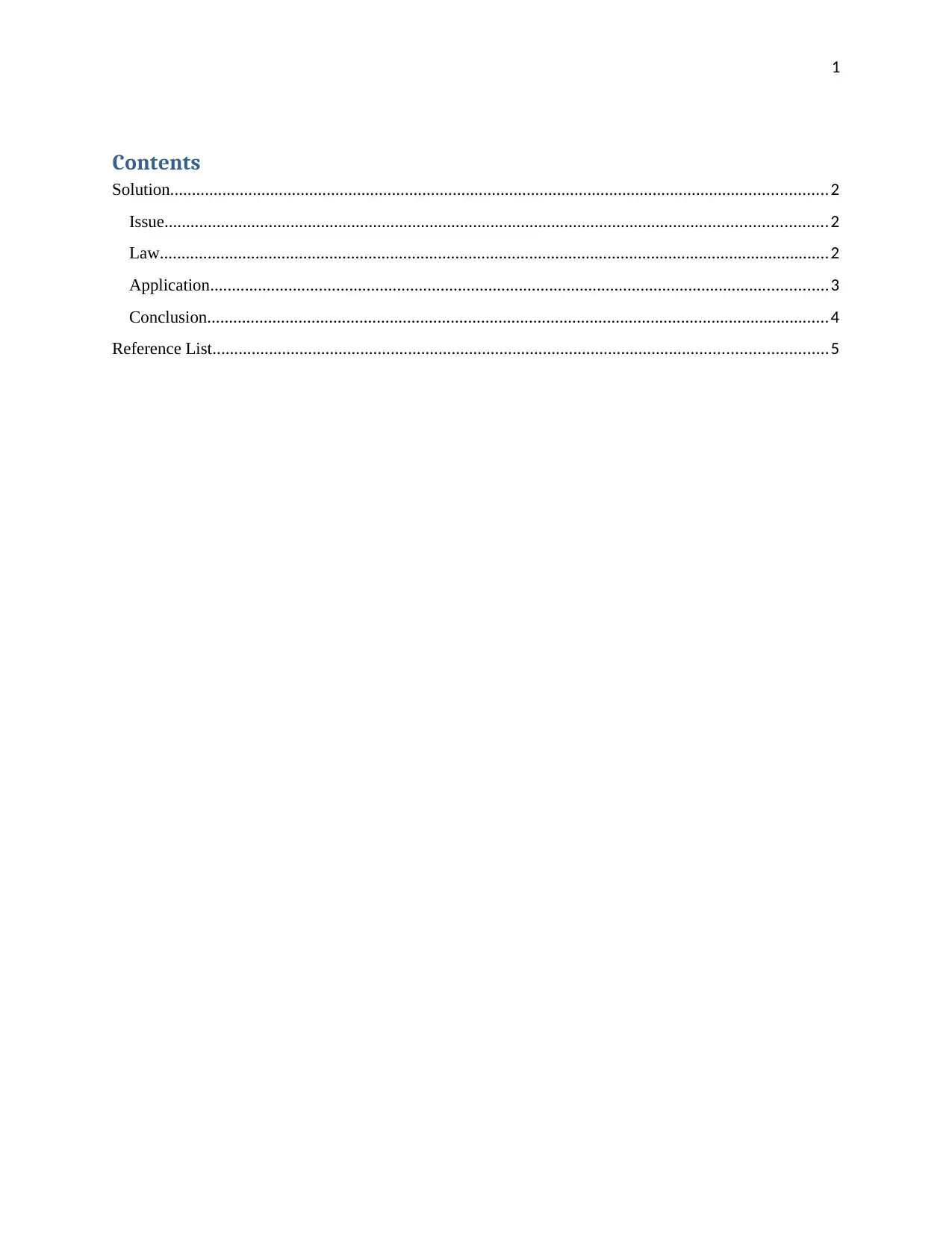
1
Contents
Solution.......................................................................................................................................................2
Issue........................................................................................................................................................2
Law..........................................................................................................................................................2
Application..............................................................................................................................................3
Conclusion...............................................................................................................................................4
Reference List.............................................................................................................................................5
Contents
Solution.......................................................................................................................................................2
Issue........................................................................................................................................................2
Law..........................................................................................................................................................2
Application..............................................................................................................................................3
Conclusion...............................................................................................................................................4
Reference List.............................................................................................................................................5
Paraphrase This Document
Need a fresh take? Get an instant paraphrase of this document with our AI Paraphraser
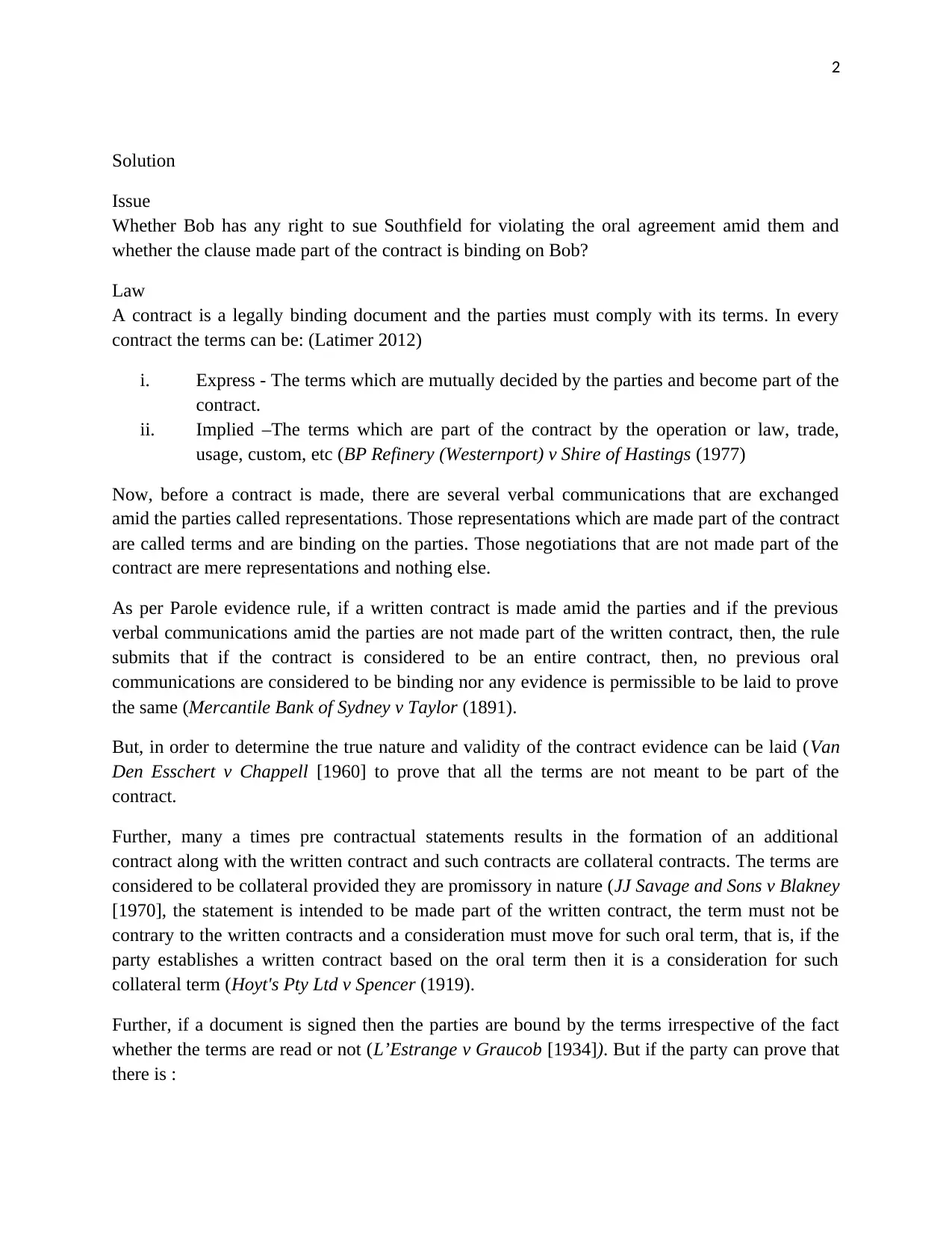
2
Solution
Issue
Whether Bob has any right to sue Southfield for violating the oral agreement amid them and
whether the clause made part of the contract is binding on Bob?
Law
A contract is a legally binding document and the parties must comply with its terms. In every
contract the terms can be: (Latimer 2012)
i. Express - The terms which are mutually decided by the parties and become part of the
contract.
ii. Implied –The terms which are part of the contract by the operation or law, trade,
usage, custom, etc (BP Refinery (Westernport) v Shire of Hastings (1977)
Now, before a contract is made, there are several verbal communications that are exchanged
amid the parties called representations. Those representations which are made part of the contract
are called terms and are binding on the parties. Those negotiations that are not made part of the
contract are mere representations and nothing else.
As per Parole evidence rule, if a written contract is made amid the parties and if the previous
verbal communications amid the parties are not made part of the written contract, then, the rule
submits that if the contract is considered to be an entire contract, then, no previous oral
communications are considered to be binding nor any evidence is permissible to be laid to prove
the same (Mercantile Bank of Sydney v Taylor (1891).
But, in order to determine the true nature and validity of the contract evidence can be laid (Van
Den Esschert v Chappell [1960] to prove that all the terms are not meant to be part of the
contract.
Further, many a times pre contractual statements results in the formation of an additional
contract along with the written contract and such contracts are collateral contracts. The terms are
considered to be collateral provided they are promissory in nature (JJ Savage and Sons v Blakney
[1970], the statement is intended to be made part of the written contract, the term must not be
contrary to the written contracts and a consideration must move for such oral term, that is, if the
party establishes a written contract based on the oral term then it is a consideration for such
collateral term (Hoyt's Pty Ltd v Spencer (1919).
Further, if a document is signed then the parties are bound by the terms irrespective of the fact
whether the terms are read or not (L’Estrange v Graucob [1934]). But if the party can prove that
there is :
Solution
Issue
Whether Bob has any right to sue Southfield for violating the oral agreement amid them and
whether the clause made part of the contract is binding on Bob?
Law
A contract is a legally binding document and the parties must comply with its terms. In every
contract the terms can be: (Latimer 2012)
i. Express - The terms which are mutually decided by the parties and become part of the
contract.
ii. Implied –The terms which are part of the contract by the operation or law, trade,
usage, custom, etc (BP Refinery (Westernport) v Shire of Hastings (1977)
Now, before a contract is made, there are several verbal communications that are exchanged
amid the parties called representations. Those representations which are made part of the contract
are called terms and are binding on the parties. Those negotiations that are not made part of the
contract are mere representations and nothing else.
As per Parole evidence rule, if a written contract is made amid the parties and if the previous
verbal communications amid the parties are not made part of the written contract, then, the rule
submits that if the contract is considered to be an entire contract, then, no previous oral
communications are considered to be binding nor any evidence is permissible to be laid to prove
the same (Mercantile Bank of Sydney v Taylor (1891).
But, in order to determine the true nature and validity of the contract evidence can be laid (Van
Den Esschert v Chappell [1960] to prove that all the terms are not meant to be part of the
contract.
Further, many a times pre contractual statements results in the formation of an additional
contract along with the written contract and such contracts are collateral contracts. The terms are
considered to be collateral provided they are promissory in nature (JJ Savage and Sons v Blakney
[1970], the statement is intended to be made part of the written contract, the term must not be
contrary to the written contracts and a consideration must move for such oral term, that is, if the
party establishes a written contract based on the oral term then it is a consideration for such
collateral term (Hoyt's Pty Ltd v Spencer (1919).
Further, if a document is signed then the parties are bound by the terms irrespective of the fact
whether the terms are read or not (L’Estrange v Graucob [1934]). But if the party can prove that
there is :
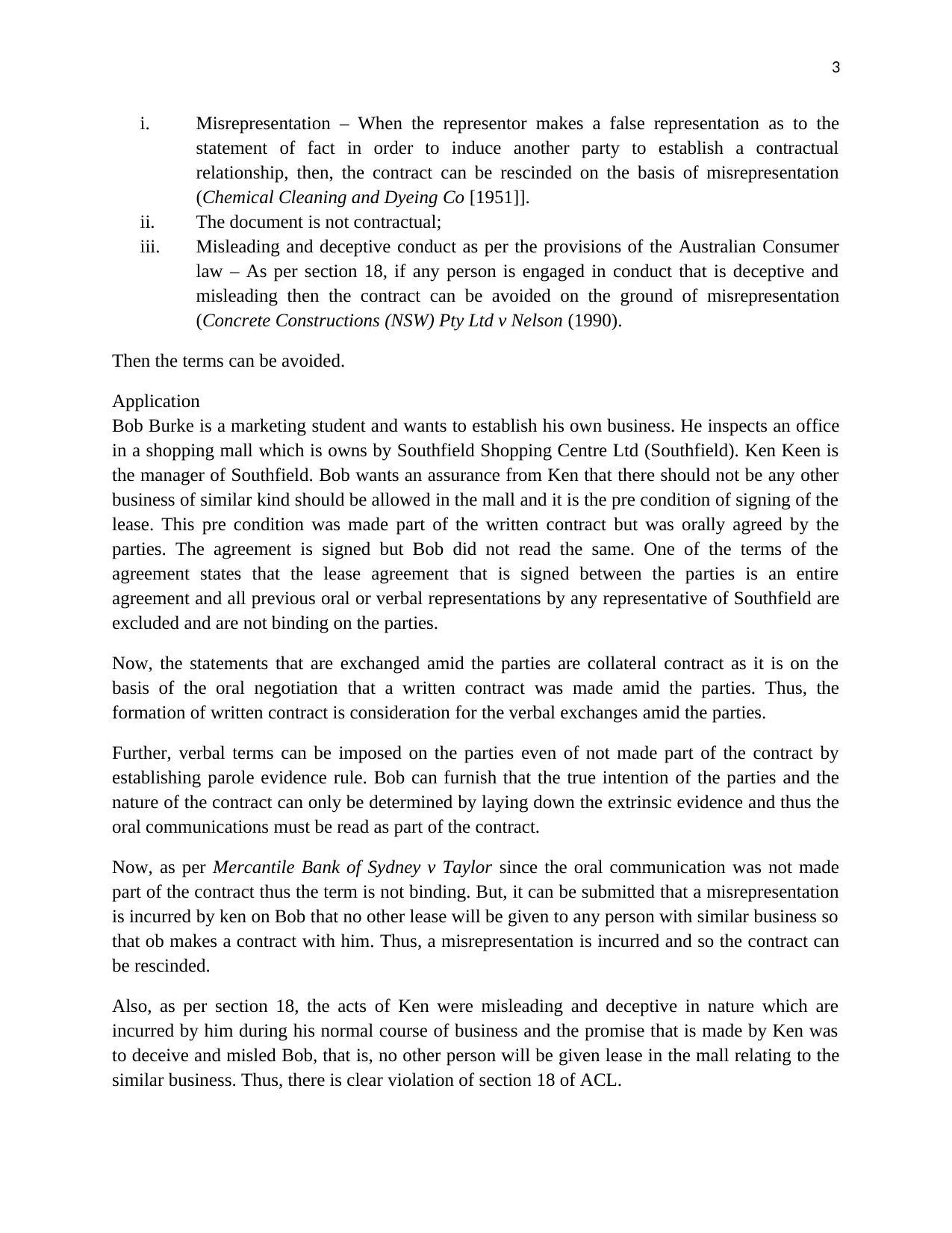
3
i. Misrepresentation – When the representor makes a false representation as to the
statement of fact in order to induce another party to establish a contractual
relationship, then, the contract can be rescinded on the basis of misrepresentation
(Chemical Cleaning and Dyeing Co [1951]].
ii. The document is not contractual;
iii. Misleading and deceptive conduct as per the provisions of the Australian Consumer
law – As per section 18, if any person is engaged in conduct that is deceptive and
misleading then the contract can be avoided on the ground of misrepresentation
(Concrete Constructions (NSW) Pty Ltd v Nelson (1990).
Then the terms can be avoided.
Application
Bob Burke is a marketing student and wants to establish his own business. He inspects an office
in a shopping mall which is owns by Southfield Shopping Centre Ltd (Southfield). Ken Keen is
the manager of Southfield. Bob wants an assurance from Ken that there should not be any other
business of similar kind should be allowed in the mall and it is the pre condition of signing of the
lease. This pre condition was made part of the written contract but was orally agreed by the
parties. The agreement is signed but Bob did not read the same. One of the terms of the
agreement states that the lease agreement that is signed between the parties is an entire
agreement and all previous oral or verbal representations by any representative of Southfield are
excluded and are not binding on the parties.
Now, the statements that are exchanged amid the parties are collateral contract as it is on the
basis of the oral negotiation that a written contract was made amid the parties. Thus, the
formation of written contract is consideration for the verbal exchanges amid the parties.
Further, verbal terms can be imposed on the parties even of not made part of the contract by
establishing parole evidence rule. Bob can furnish that the true intention of the parties and the
nature of the contract can only be determined by laying down the extrinsic evidence and thus the
oral communications must be read as part of the contract.
Now, as per Mercantile Bank of Sydney v Taylor since the oral communication was not made
part of the contract thus the term is not binding. But, it can be submitted that a misrepresentation
is incurred by ken on Bob that no other lease will be given to any person with similar business so
that ob makes a contract with him. Thus, a misrepresentation is incurred and so the contract can
be rescinded.
Also, as per section 18, the acts of Ken were misleading and deceptive in nature which are
incurred by him during his normal course of business and the promise that is made by Ken was
to deceive and misled Bob, that is, no other person will be given lease in the mall relating to the
similar business. Thus, there is clear violation of section 18 of ACL.
i. Misrepresentation – When the representor makes a false representation as to the
statement of fact in order to induce another party to establish a contractual
relationship, then, the contract can be rescinded on the basis of misrepresentation
(Chemical Cleaning and Dyeing Co [1951]].
ii. The document is not contractual;
iii. Misleading and deceptive conduct as per the provisions of the Australian Consumer
law – As per section 18, if any person is engaged in conduct that is deceptive and
misleading then the contract can be avoided on the ground of misrepresentation
(Concrete Constructions (NSW) Pty Ltd v Nelson (1990).
Then the terms can be avoided.
Application
Bob Burke is a marketing student and wants to establish his own business. He inspects an office
in a shopping mall which is owns by Southfield Shopping Centre Ltd (Southfield). Ken Keen is
the manager of Southfield. Bob wants an assurance from Ken that there should not be any other
business of similar kind should be allowed in the mall and it is the pre condition of signing of the
lease. This pre condition was made part of the written contract but was orally agreed by the
parties. The agreement is signed but Bob did not read the same. One of the terms of the
agreement states that the lease agreement that is signed between the parties is an entire
agreement and all previous oral or verbal representations by any representative of Southfield are
excluded and are not binding on the parties.
Now, the statements that are exchanged amid the parties are collateral contract as it is on the
basis of the oral negotiation that a written contract was made amid the parties. Thus, the
formation of written contract is consideration for the verbal exchanges amid the parties.
Further, verbal terms can be imposed on the parties even of not made part of the contract by
establishing parole evidence rule. Bob can furnish that the true intention of the parties and the
nature of the contract can only be determined by laying down the extrinsic evidence and thus the
oral communications must be read as part of the contract.
Now, as per Mercantile Bank of Sydney v Taylor since the oral communication was not made
part of the contract thus the term is not binding. But, it can be submitted that a misrepresentation
is incurred by ken on Bob that no other lease will be given to any person with similar business so
that ob makes a contract with him. Thus, a misrepresentation is incurred and so the contract can
be rescinded.
Also, as per section 18, the acts of Ken were misleading and deceptive in nature which are
incurred by him during his normal course of business and the promise that is made by Ken was
to deceive and misled Bob, that is, no other person will be given lease in the mall relating to the
similar business. Thus, there is clear violation of section 18 of ACL.
⊘ This is a preview!⊘
Do you want full access?
Subscribe today to unlock all pages.

Trusted by 1+ million students worldwide
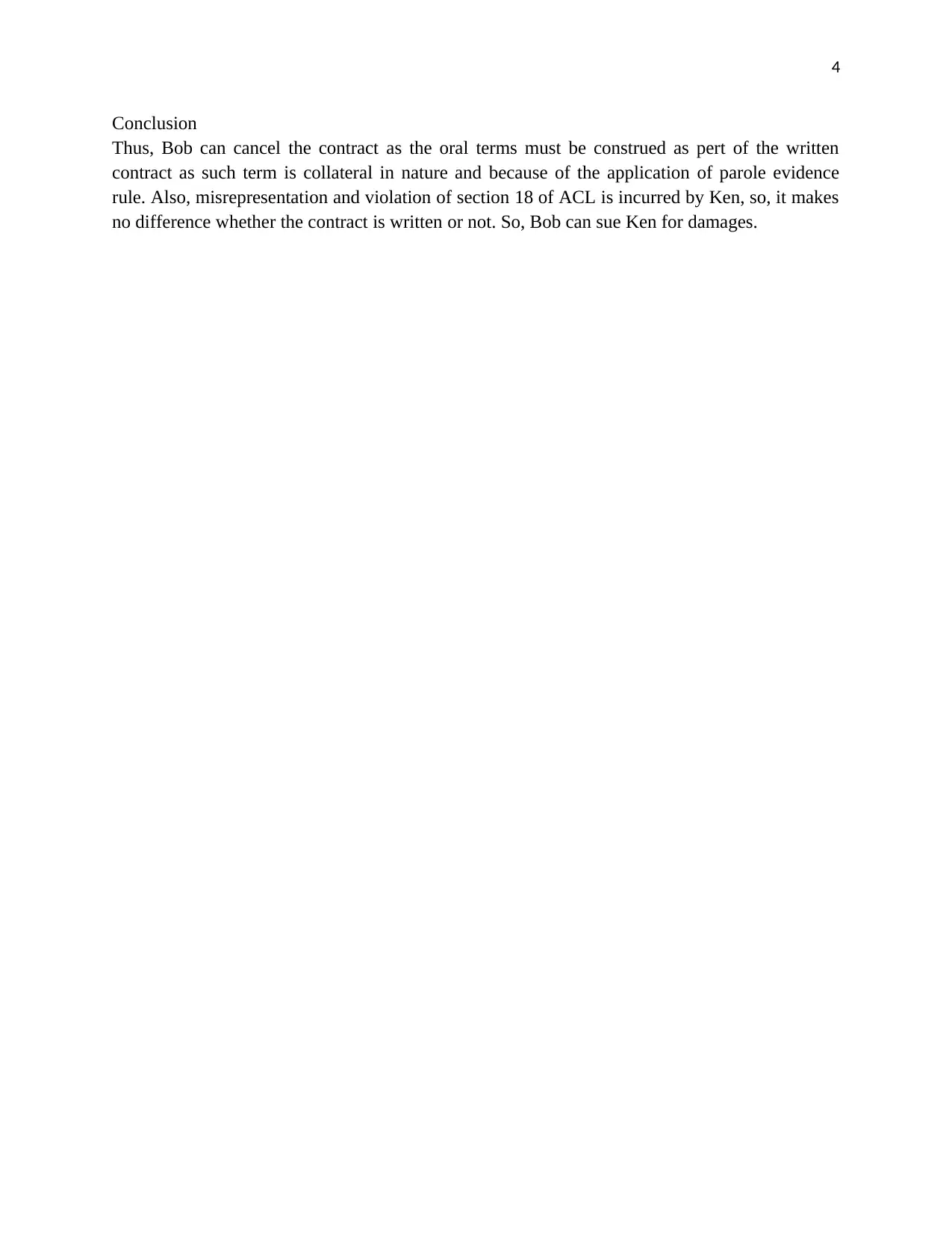
4
Conclusion
Thus, Bob can cancel the contract as the oral terms must be construed as pert of the written
contract as such term is collateral in nature and because of the application of parole evidence
rule. Also, misrepresentation and violation of section 18 of ACL is incurred by Ken, so, it makes
no difference whether the contract is written or not. So, Bob can sue Ken for damages.
Conclusion
Thus, Bob can cancel the contract as the oral terms must be construed as pert of the written
contract as such term is collateral in nature and because of the application of parole evidence
rule. Also, misrepresentation and violation of section 18 of ACL is incurred by Ken, so, it makes
no difference whether the contract is written or not. So, Bob can sue Ken for damages.
Paraphrase This Document
Need a fresh take? Get an instant paraphrase of this document with our AI Paraphraser
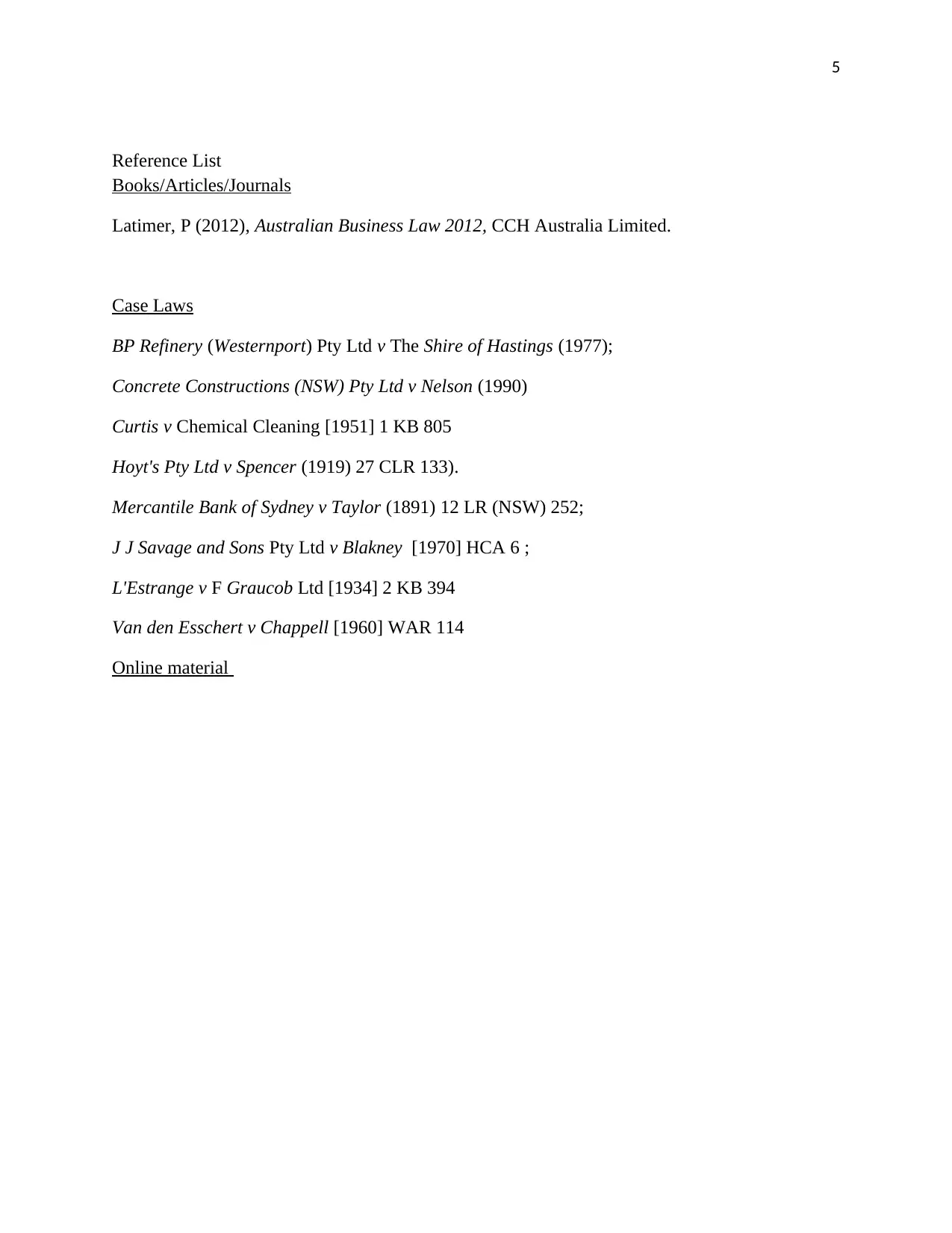
5
Reference List
Books/Articles/Journals
Latimer, P (2012), Australian Business Law 2012, CCH Australia Limited.
Case Laws
BP Refinery (Westernport) Pty Ltd v The Shire of Hastings (1977);
Concrete Constructions (NSW) Pty Ltd v Nelson (1990)
Curtis v Chemical Cleaning [1951] 1 KB 805
Hoyt's Pty Ltd v Spencer (1919) 27 CLR 133).
Mercantile Bank of Sydney v Taylor (1891) 12 LR (NSW) 252;
J J Savage and Sons Pty Ltd v Blakney [1970] HCA 6 ;
L'Estrange v F Graucob Ltd [1934] 2 KB 394
Van den Esschert v Chappell [1960] WAR 114
Online material
Reference List
Books/Articles/Journals
Latimer, P (2012), Australian Business Law 2012, CCH Australia Limited.
Case Laws
BP Refinery (Westernport) Pty Ltd v The Shire of Hastings (1977);
Concrete Constructions (NSW) Pty Ltd v Nelson (1990)
Curtis v Chemical Cleaning [1951] 1 KB 805
Hoyt's Pty Ltd v Spencer (1919) 27 CLR 133).
Mercantile Bank of Sydney v Taylor (1891) 12 LR (NSW) 252;
J J Savage and Sons Pty Ltd v Blakney [1970] HCA 6 ;
L'Estrange v F Graucob Ltd [1934] 2 KB 394
Van den Esschert v Chappell [1960] WAR 114
Online material
1 out of 5
Related Documents
Your All-in-One AI-Powered Toolkit for Academic Success.
+13062052269
info@desklib.com
Available 24*7 on WhatsApp / Email
![[object Object]](/_next/static/media/star-bottom.7253800d.svg)
Unlock your academic potential
Copyright © 2020–2026 A2Z Services. All Rights Reserved. Developed and managed by ZUCOL.




